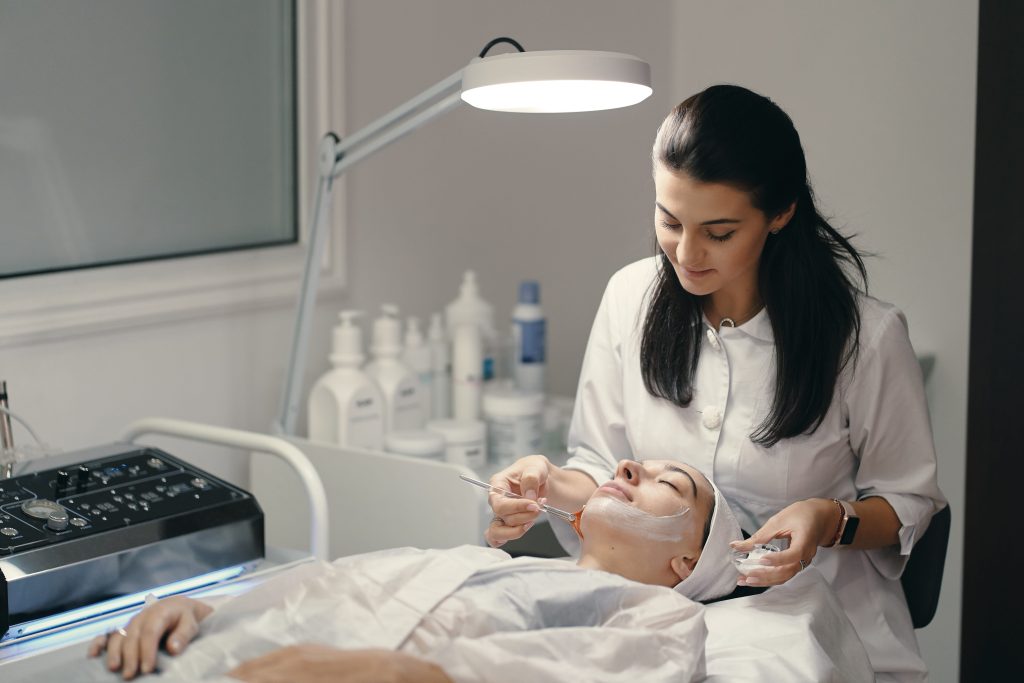
1.Skinimalism & Minimalist Routines
Dermatologists and cosmatology experts are championing the concept of “skinimalism,” also known as Skinimalism 2.0—a movement toward simplified skincare regimens with high-impact, fewer products. Instead of complex 10-step routines, people are opting for multi-tasking products (cleanser + toner, sunscreen + antioxidants)
The goal: fewer ingredients, less irritation, more efficacy—especially beneficial for sensitive skin .
This minimalist approach aligns with sustainability goals: lower waste, reduced water usage, and cleaner ingredient sourcing—trends validated by dermatology-focused outlets .
2.Regenerative & Biotech‑Powered Ingredients
2025 is witnessing a biotech boom in skincare. Ingredients derived from exosomes, polynucleotides (PDRN), growth factors, stem cells, and peptides are gaining traction. These components aim to foster skin regeneration at a cellular level
- Exosomes are nano-vesicles involved in cell communication. Experts suggest topical exosome products may reduce inflammation and stimulate regeneration .
- PDRN, derived from salmon DNA, pumps up collagen synthesis and wound healing—already trending in K‑beauty and cosmatology circles .
- Growth factors and peptides—especially biomimetic peptides—help build collagen and elastin, mimicking the skin’s natural messaging systems
Although still emerging, these regenerative ingredients are being echoed by dermatologists who emphasize repair through high-tech, yet gentle delivery systems
3.Advanced Beauty‑Tech & At‑Home Devices
The cosmatology and dermatology fields are embracing technology in the home. Expect to see:
- LED light masks (red/blue/near-infrared) that stimulate collagen and reduce acne .
- Microcurrent and HIFU-like devices for toning and lifting—e.g., Medicube’s AGE-R Booster Pro.
- Wearable skin sensors like Hapsense, offering data-driven skincare via AI analysis .
Dermatologists advise caution—at-home tech can be effective but improper use may cause irritation, burns, or suboptimal results .
4.Personalized Skincare: AI, Genetic Testing & XR
Dermatologists now have access to advanced tools—AI skin analysis apps, genetic testing kits, and even AI-enhanced XR mirrors—to develop personalized skincare plans .
- AI + genetics: Tailored skincare based on DNA predispositions and real-time AI diagnostics, fashioning precision cosmatology regimens .
- Augmented reality (AR)/XR diagnostics: Virtual skin consultations merge with AI-driven suggestions, aiding consumers in choosing efficacious products .
This trend is bolstered by AI-backed precision medicine that redefines how dermatologists diagnose and manage inflammatory skin conditions.
5.Next‑Gen Multifunctional Sunscreens
Gone are the days of bulky sunblocks. In 2025, we’ll see sunscreens that go beyond UV protection—they’ll incorporate DNA repair enzymes, microbiome-balancing technology, and blue-light defense . Korean, Japanese, and French formulations are pioneering these multispectrum formulas that double as moisturizers and antioxidants.
This innovation draws on cosmatology research into barrier integrity and prevention of photoaging—the leading skincare concern worldwide .
6.Microbiome‑Balancing Skincare
A focus on the skin’s microbiome has taken dermatology and cosmatology by storm. Expect to see prebiotic, probiotic, and postbiotic formulations designed to restore microbial balance—especially for conditions like eczema and rosacea.
Ingredients like lactobacillus, bifidobacterium, and microbial metabolites are becoming mainstream in cleansers, toners, and moisturizers.
7.Advanced Anti‑Pigment Treatments
Hyperpigmentation remains a top concern. In 2025, trends include:
- Use of tranexamic acid in topical serums to reduce dark spots.
- Exosome and peptide-powered brightening products addressing pigmentation via regenerative mechanisms .
These solutions are backed by dermatologist-led research and reflect deeper cosmatology insights in barrier repair and evening tone.
8.Edible Beauty & Nutraceuticals
We are entering the “beauty-from-within” era. Edible skincare—supplements such as polyphenols, vitamin C, collagen peptides, retinol pills, and probiotics—are marketed to enhance elasticity, hydration, and appearance .
Dermatologists caution that while some nutraceuticals have evidence (e.g. probiotics, polyphenol-rich botanicals), they should complement, not replace, topical regimens.
9.Barrier Repair as Cornerstone
The skin’s barrier function remains central to dermatologists and cosmatology practice. Expect to see:
- Targeted ceramides, niacinamide, peptides, and squalane in moisturizers and cleansers.
- A movement away from harsh surfactants, fragrances, and alcohol-heavy formulas—favoring gentle, hypoallergenic products.
Dermatologists emphasize that repairing the barrier is a prerequisite for effective cosmatology treatments targeting anti-aging, pigmentation, or acne .
10.Holistic & Aesthetic‑Inspired Care
Wellness and aesthetics intersect in modern skincare. The trends include:
- Holistic facials that blend aromatherapy, lymphatic drainage, acupressure, and energy work—gaining traction as mind‑body care in cosmatology.
- “Faceification” of body care—advanced ingredients like peptides, ceramides, and antioxidants are being used beyond the face to nourish hands, neck, and limbs .
- Uptick in infrared saunas and at-home wellness tools aimed at improving circulation, reducing inflammation, and boosting relaxation alongside skin benefits .
Cosmatology professionals view this broader approach as essential to achieving radiant, long-term skin health.
How to Upgrade Your 2025 Routine
Here’s a step-by-step cosmatology‑inspired routine that incorporates 2025’s biggest trends:
| Step | Action | Why it matters |
|---|---|---|
| 1. Cleanse | Gentle, barrier-friendly cleanser with ceramides or niacinamide | Maintains skin integrity, reduces irritation |
| 2. Treat | Targeted serum: tranexamic acid/peptides/exosomes | Addresses pigmentation and regeneration |
| 3. Moisturize | Multi-functional moisturizer with SPF + antioxidants | Simplifies routine while protecting and nourishing |
| 4. Skin Tech (optional) | LED mask or microcurrent 3x/week | Boost collagen and glow safely |
| 5. Edible Boost | Supplements: collagen peptides + probiotics | Enhances from within, complements topical care |
| 6. Night Routine | Melatonin or growth factor night serum | Enhances repair during sleep |
| 7. Weekly Treatment | Holistic facial or at-home lymphatic massage | Improves circulation and relaxation |
| 8. Consultation | Digital skin analysis or dermatologist visit | Personalizes your routine with data-backed insights |
Final Word from Dermatologists & Cosmatology Experts
- Dermatologists emphasize that no single ingredient is a miracle—it’s the thoughtful integration of barrier care, targeted actives, sun protection, and lifestyle habits that yields transformative results .
- The rise of AI diagnostics, biotech actives, and beauty devices provides unmatched personalization—cosmatology now blends artistry with science to deliver outcomes that are both visible and safe .

Leave a Comment